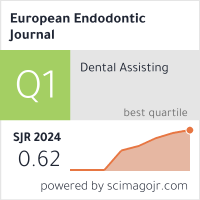Metrics
2024 IMPACT FACTOR
5 year Impact Factor
Eigenfactor Score
2024 CiteScore
Journal Citation Reports
(Clarivate 2025, JIF Rank)
Efficacy of Two Different Concentrations of Iodine-potassium Iodide Solution in Endodontic Retreatment: A Randomised Double-blinded Clinical Trial
Meerna Sarkees1, Hisham Alafif1, Samar Ali Alsalameh2, Hassan Achour11Department of Endodontics, Damascus University, Faculty of Dentistry, Damascus, Syria2Department of Basic Science, Damascus University, Faculty of Dentistry, Damascus, Syria
Objective: This study aimed to evaluate the antibacterial effectiveness of two concentrations of iodine-potassium iodide (IKI) used as the final irrigating solution during endodontic retreatment.
Methods: Thirty symptom-free root-filled anterior teeth with chronic apical periodontitis (<5*5mm) were included. They were divided into two groups consisting of 15 teeth according to the method of final irrigation. Group 1 were irrigated with 2% IKI, and Group 2 with 5% IKI. The direct bacterial viable count method was performed to determine the number of colony-forming units (CFUs) before and after disinfection. The reduction in bacterial count was assessed, and statistical analysis was performed using MannWhitney U tests with a 95% confidence level.
Results: Irrigation with 5% IKI resulted in significantly reduced bacterial counts than 2% IKI irrigation (p<0.05), indicating greater antibacterial effects.
Conclusion: The use of a 5% IKI solution as the final irrigating agent in endodontic retreatment cases with chronic apical periodontitis significantly reduces bacterial counts compared to a 2% IKI solution. The 5% IKI solution therefore exhibited a superior antibacterial effect. Consequently, 5% IKI solution application improves microbiological outcomes and enhances the overall disinfection of the root canal system. (EEJ-2024-08-131)
Keywords: Antibacterial, colonies forming units, endodontic retreatment, iodine-potassium iodide, periapical lesion
Manuscript Language: English
(570 downloaded)



